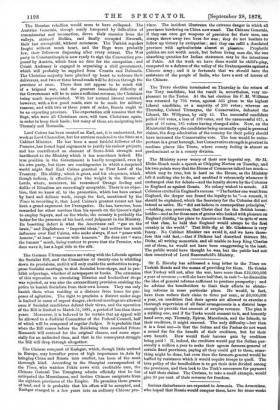Lord Cairns has been created an Earl, not, it is
understood, for work as Lord Chancellor, but for services rendered to the State as a Cabinet Minister. He has been a most faithful follower of the Premier, has found legal arguments to justify his rashest projects, and has contributed an element of Scoto-Irish strength and hardihood to the Ministry which it has sometimes lacked. His true position in the Government is hardly recognised, even by his own party, but there are contingencies in which a surprised world might find Earl Cairns gazetted as First Lord of the Treasury. His ability, which is great, and his eloquence, which, though tedious, is effective, give him weight in the House of Lords, where, moreover, his restrained Orange feeling and dislike of Ritualism are exceedingly acceptable. There is no objec- tion, that we know of, to the promotion, which has been earned by hard and delicate work, except the fact, mentioned by the Times in recording it, that Lord Cairns's greatest recent act has been a grand argument for Prerogative. He has, however, been rewarded for other services than his speech on the Queen's right to employ Sepoys, and on the whole, the country is probably the better for the presence of his hard, cool judgment in the Ministry. Its besetting defect is what the Americans call "gas on the brain," and Englishmen "Imperial ideas," and neither has much influence over Earl Cairns, who seeks always, if not "peace with honour," at least "success with honours." Ile does not "wave the banner" much, being content to prove that the Premier, who does wave it, has a legal title to the silk.






























 Previous page
Previous page